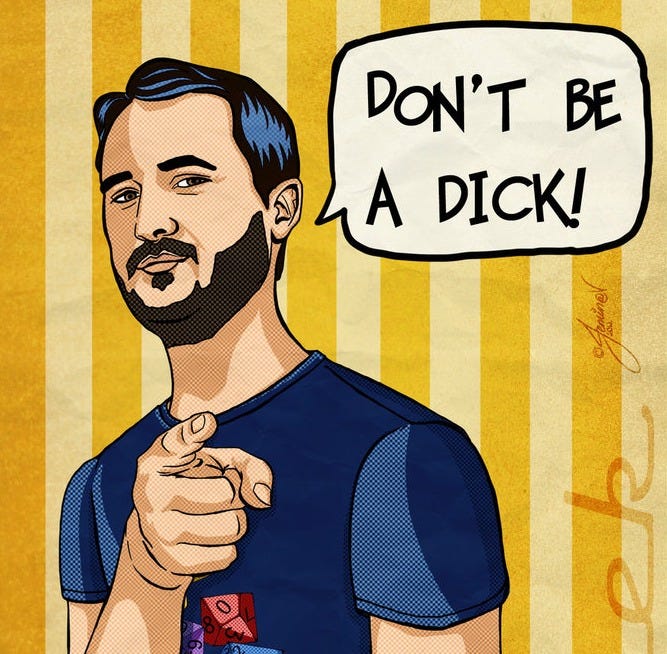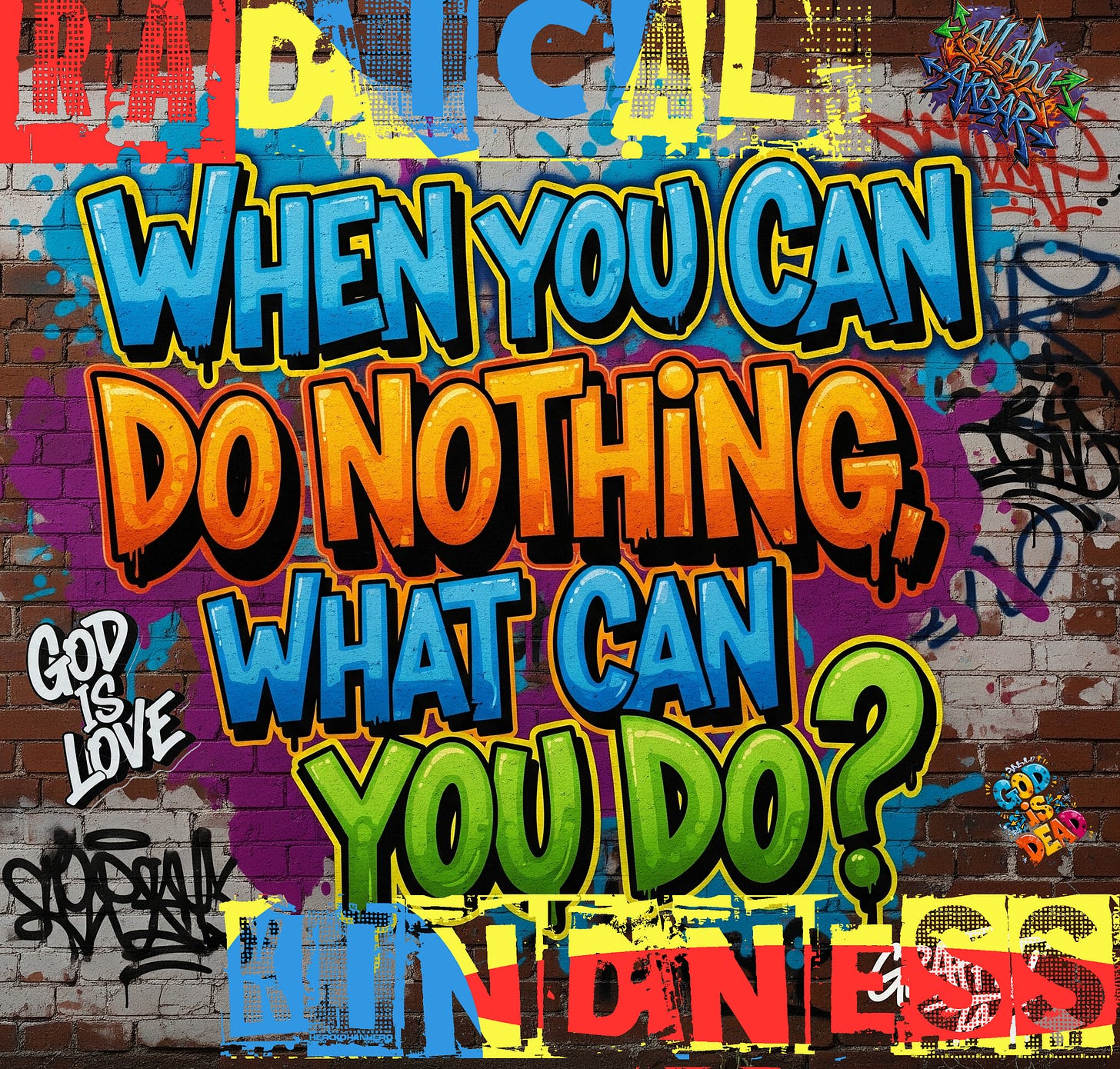Is Faith Needed for Morality? Spoiler: It Doesn't Matter
What you build matters more than why you're building it
The stated mission of my writing is to build a better world by helping people recognize the impact of their choices and be intentional in building the only part of that world they truly control.
Themselves.
Along the way I’ve discussed other moral philosophies in contrast, Scanlon’s Contractualism, or in passing, Singer’s Effective Altruism, as well as made nods to the canon, Aristotle, Kant, Nietzsche, etc.
But what I haven’t yet discussed directly is that topic you are warned to stay away from in polite conversation…
Religion.
Or more accurately, how do Architectural Humanism and Ledger Ethics fit alongside religious belief? Or does it belong there at all? Or am I simply repainting secular humanism for the atheists who don’t want to live like assholes?
The fact is that I am an atheist, but this framework is not built solely for atheists. While I am non-believer, I have not always been, I lived deeply my faith for a significant period of both my adolescence and adult life. And despite having deeply considered my deconversion, I am still humble enough to know that I may be wrong, and that I lack anything resembling certainty on the metaphysical.
But for Architectural Humanism and Ledger Ethics, it doesn’t matter what you believe in regard to the supernatural. It doesn’t even matter if you believe.
It matters how you live. And how that living impacts those around you.
Inheritance and Construction
We are architects of ourselves. We build with the materials we have at hand. Some of those materials are inherited.
The faith of our fathers.
Some materials we seek out and bring into our lives.
The Sauls on the road to Damascus.
Some choose to work with no religion at all.
The faithful to humanity itself.
But even those of faith and those without are still inheritors of ideas that bridge our differences. From across time and place we can observe the Law of Reciprocity recurring again and again:
Therefore all things whatsoever ye would that men should do to you, do ye even so to them: for this is the law and the prophets. – Jesus, Matthew 7:12
सर्वा दिशस् त्व् अनुपरिगम्य चेतसा नैवाध्यगात् प्रियतरं आत्मनः क्वचित् ।
एवं प्रियः पृथग् आत्मा परेषां तस्मान् न हिंस्यात् परं आत्मकारणम् ॥ १८ ॥
18. Look where you will, there is nothing dearer to man than himself; therefore, as it is the same thing that is dear to you and to others, hurt not others with what pains yourself.1 – Siddhartha Gautama, Udana-Varga 5.18
عَنْ أَبِي حَمْزَةَ أَنَسِ بْنِ مَالِكٍ رَضِيَ اللهُ عَنْهُ خَادِمِ رَسُولِ اللَّهِ صلى الله عليه و سلم عَنْ النَّبِيِّ صلى الله عليه و سلم قَالَ: "لَا يُؤْمِنُ أَحَدُكُمْ حَتَّى يُحِبَّ لِأَخِيهِ مَا يُحِبُّ لِنَفْسِهِ". رَوَاهُ الْبُخَارِيُّ [رقم: 13]، وَمُسْلِمٌ [رقم: 45].
[رَوَاهُ الْبُخَارِيُّ] ، [وَمُسْلِمٌ]None of you will believe until you love for your brother what you love for yourself.2 – The Prophet Muhammad, reported by Anas ibn Malik (related in Sahih al-Bukhari, hadith no. 13 and Sahih Muslim, hadith no. 45)
मयि क्रुद्धे जगन्न स्यान्मयि सर्वं प्रतिष्ठितम् ।
देवदानवगन्धर्वाः किंनरोरगराक्षसाः ॥ १७ ॥This is the sum of duty: Do not do to others what would cause you pain if done to you. – Vyasa, Mahabharata 5.1517
ὡς ἂν αὐτοῖς εὐχόμεθα τοὺς φίλους, οὕτω καὶ ἡμᾶς δεῖ πρὸς αὐτοὺς ἔχειν
We should behave to friends as we would wish friends to behave to us. – Aristotle, as attributed by the Greek biographer Diogenes Laërtius
Don’t be a dick. – Wil Wheaton, the Internet
These are woven into the DNA of one of my central aphorisms:
You owe me nothing, I owe you everything

The Pushback
However, I can hear pushback from the faithful and faithless, surprisingly in harmony.
“You either have morals from religion, or morals without. You can’t straddle the fence!”
“Christopher Hitchens isn’t drinking Kool-Aid made from Samarian well water!”
Well, maybe not that second one, unless the people saying it were trying to show how smart they are referencing a famous atheist and one of Jesus parables.
But I don’t know no one like that.
My point here isn’t to somehow alienate everyone by trying to appease them. As with everything in Architectural Humanism and Ledger Ethics, the concept of them aligning with believers and non-believers alike is rooted in my own lived experience.
God, dogs, and a long walk down the Roman’s Road
I grew up in the bible belt, specifically in and around Jacksonville, FL. The question wasn’t if you went to church, it was which church do you go to?
I went to a lot of churches as I grew up. My dad, being a level 19 charlatan, recognized how he could benefit from packing the kids off to a new church every few months. Quieter Sunday mornings, new marks to milk for everything their kindness would permit. Once milked dry, he packed us off to a new church.
At nine I watched life-size dummy representing Jezebel, covered in peanut butter, show us how she was torn apart by dogs, using real dogs.
At eleven a Sunday school teacher confidently taught our class about how the dirty Russian communists dug a hole all the way to Hell, hearing the screams of the damned. Not to mention all the Chick Tracts I could read.
But in my teen years I finally embraced faith on my own terms. In a small, dimly lit sanctuary in Hilliard, FL, a youth group leader got me to open up about the pain and trauma I carried so heavy, and showed me genuine Christian love and compassion in a way that reduced me to tears. Within a few months I found myself at the alter during an Easter Passion play walking the Roman’s Road with sincerity and conviction.
My twin sister died when we were 19, and I walked away from the church.
I wasn’t an atheist, but angry with a deity that would allow her light to be darkened in the blink of an eye.
I wasn’t an atheist, but I still saw myself as Jacob in Genesis, wrestling with God but refusing to let go.
In my late twenties, having dinner with some of those same church youth ministers from my teens, one addressed this battle within me.
Directly.
“God did not kill your sister,” she said with a mix of ferocity and affection, “If you have faith as small as a mustard seed, you can say to this mountain, ‘Move from here to there,’ and it will move. Nothing will be impossible for you, that’s it, that’s what Jesus said. Faith can be battered, bruised, and broken, all that matters is that you have it.”
I went back, and I went all in. Not just attending church. I became a youth volunteer, looking to impact lives as mine had been impacted. I spent late nights editing video for children’s ministry. I went weekly to the juvenile detention center and led kids in the same prayer I’d made at their age.
My deconversion is too long a story to be included here, but it was not done lightly. And once I fully shed my faith, I then wrestled with existential weight of being responsible for my own morality. And I don’t just mean that metaphorically; my legs went weak walking through my office while coming to this full realization.
My story of untangling faith to build a moral framework is the heart of this publication.
Join the Work
The Cosmology of Architectural Humanism and Ledger Ethics
So, if I am writing a thorough explanation of my entire philosophical framework and I need to lay down its cosmology, it’s this:
· The universe isn’t chaos, but it isn’t ordered. It runs on rules we can discover, but there is no guiding hand.
· Outside of sentient reasoning, there is no reason. And on the spectrum between instinct and reason, humanity’s place is blurrier than we admit.
· Causality can be understood through known rules, like Newtonian physics, for example, but human comprehension hits a wall. Randomness is only the appearance of infinite variables beyond our grasp.
· Certainty is a mirage. The only certainty is that we cannot be certain.
But ultimately none of that is really important. Whether you agree with my explanation or have faith that we are all a part of the designs of a deity or deities, what does matter is the person you build within beliefs you have.
The What That Matters
There is a near infinite number of explanations to “why” and “how” of existence. A cornucopia of choice to the question of “who” we acknowledge for authority and “where” we find knowledge and wisdom. Any number of materials that can support our architecture.
I can’t tell you if you should believe, or if my ideas about the metaphysical, or lack of it, are true or correct. I’m a person. People have limits to what we can understand with this three pound lump of electrified flesh between our ears.
What I can tell you is that for how we manage a random Friday in September there is a “what” that matters.
I’m not a person of faith. But I have been blessed by those who are people of faith, inspired by their faith.
I don’t recognize the authority of any prophet, but I do respect the wisdom they’ve passed on, wisdom we can see so beautifully woven across history and cultures.
The differences we have will bring us different answers. But if we believe that the question of “What do we owe each other?” drives us to witness one another with respect and dignity, if it drives us to create good, to not look away when there is harm, to understand that the project of ourselves is never complete, then our differences are not truly divides.
They are the materials that we use to build our contributions to the tapestry of humanity. They are richness of an inheritance we all owed, and to which we will pass on to the future.
The Ledger does not seek to convert. It is not here in conflict with faith. It is here as a tool to enhance.
There is room enough within the margins for every cosmology, every creed, every doubt. The full spectrum of understanding of our place in the Grand Scheme.
The only question is: what are you writing in yours?
If you're ready to explore practical philosophy for everyday ethical decisions, without the academic jargon, subscribe to Radical Kindness: Empathy as Rebellion. Every week, I share frameworks for navigating moral complexity, personal stories of growth through adversity, and tools for building a more ethical life.
Join a growing number of thoughtful readers who are figuring out how to be good humans in a complicated world.
Woodville Rockhill, W. (1975), Udânavarga: a collection of verses from the Buddhist canon compiled by Dharmatrâta, Oriental Press, Amsterdam (reprint).
Artwork by jeminabox, Wil Says... (2012). Available on DeviantArt: https://www.deviantart.com/jeminabox/art/Wil-Says-293411984





You write so beautifully about such deep topics like morality. I really admire that about you!